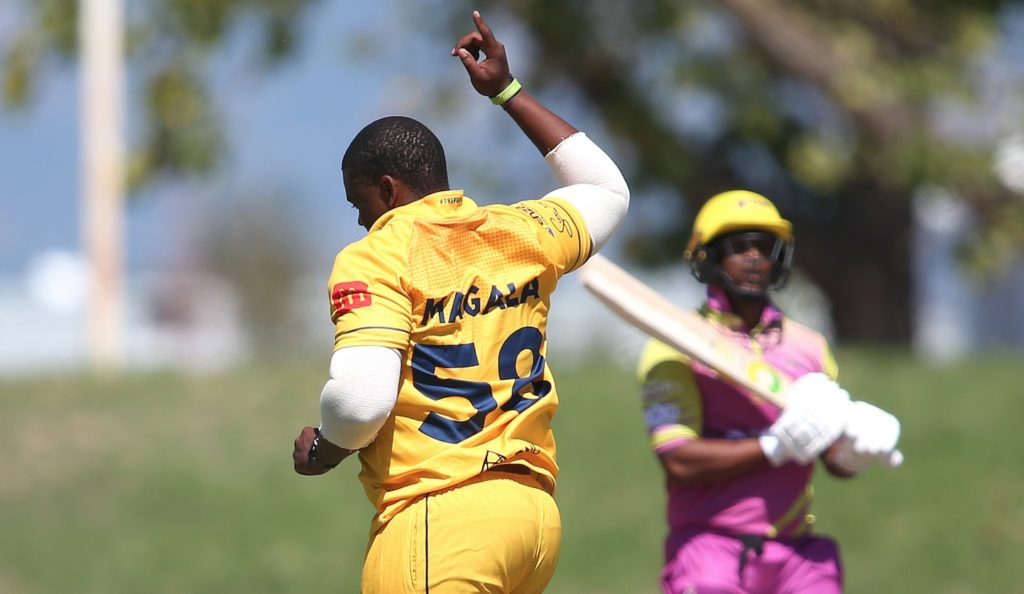There is a debate raging about whether talented players who don’t meet minimum fitness standards should be considered for Proteas selection. There shouldn’t be, writes RYAN VREDE.
Fast bowler Sisanda Magala was omitted from the Proteas squad for the recent ODI series against Bangladesh after failing to meet the team’s minimum fitness standard. Magala has failed other tests since 2020, too.
“Every player knows what he has to do from a fitness point of view if he wants to be selected for the team. Magala can only point the finger at himself, ” said Proteas captain Temba Bavuma.
There is, however, significant support for Magala, based on his domestic form. He was a strong performer in the domestic four-day series this past season, taking 15 wickets in four matches at an average of 19.73. He further strengthened his case through his excellence in the current domestic One-Day Cup, where he is the tournament’s leading wicket-taker.
In an interview with Rapport on Sunday, Magala’s former franchise coach, Geoffrey Tonyana, defended him, saying: “A balance must be found. Get other tests to assess certain players’ fitness standards.
“It’s not that Sisanda is struggling to complete his overs. In four-day cricket, he sometimes bowls up to 30 overs a day. And that at 135km/h or faster.
“Fitness tests are important, but find other ways to test certain players. In my opinion, Sisanda should be part of South Africa’s squad in white-ball cricket. His record in one-day cricket over the past five years testifies to that.”
Former Proteas spinner and current Warriors head coach Robin Peterson countered, saying: “You need a certain minimum fitness standard for provincial and SA players, as is currently the case. There are standardised fitness tests that apply to both provincial and international players.
“Your wicketkeepers and versatile players must be some of the fittest players in the team. The point is just: if you want to play for the Proteas, you have to understand that the intensity is much higher than at provincial level.”
Peterson said the impact of an unfit player could have a ripple effect on a team, adding: “If you are desperate to play for the Proteas, you will go out of your way to meet the minimum standards.”
Just over a year ago, I set Twitter ablaze when I tweeted my observations about Dolphins seamer Robbie Frylinck’s poor conditioning. I don’t remember the exact wording, but it was along the lines of: “Frylinck’s conditioning reflects a deep professional entitlement.”
I could have been more articulate and clear, and I suspect that would have saved me the headache of being accused of fat-shaming a professional athlete. The point I was trying to make was that Frylinck had been allowed to get away with sub-standard conditioning at that point in his career, and therefore had no incentive to improve in this regard.
He is a talented player, evidenced by a strong domestic record. Yet, I wonder how much more he could have achieved in his career had he combined that talent with elite conditioning.
There is no question that superior conditioning allows an athlete’s performance to soar in ways it could not when inhibited by poor conditioning. So, the question then is: How determined are the athletes in question to explore the outer limits of their potential?
If the answer is that they are committed to this cause, it would reflect in their conditioning. And, if Magala is determined to build an international career, it should reflect in his action. Inaction would speak volumes about his ambition.
Any job in any profession has key performance criteria. The organisation you’re applying to gets to set that criteria based on their professional goals. If you meet that criteria, you improve your chance of being hired. If you don’t, they move on. You don’t get to set the criteria.
In this context, I fail to understand the defense of Magala. The Proteas have a minimum fitness standard that must be met if you want to play at the game’s elite level. Magala could not meet that standard. So they’ve moved on.
There is no debating his talent. Indeed, the Proteas have recognised his talent by including him in squads. But they’ve also declared that talent is the bare-minimum entry requirement. That talent, they’ve established, must co-exist with elite conditioning. It is irrelevant that he meets the Lions’ conditioning standards and is performing well for them in domestic cricket.
It is telling that the top-ranked cricketers across all formats in the game are observably excellently conditioned. If talent alone carried you at the game’s highest levels, those rankings would reflect it insomuch as it would be populated by more players that look like Magala.
Magala is not a victim of an unfair system. He has complete control of his professional future.







